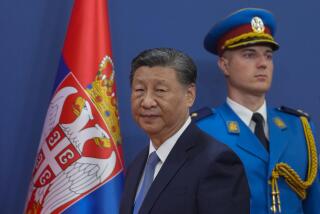Justice Officials Introduce Tighter Immigrant Policy
The Justice Department moved Wednesday to crack down on foreigners with suspected terrorist ties, broadening the federal government’s power to deny visas or deport immigrants who “endorse” terrorism.
It was the department’s first policy step toward implementing a sweeping anti-terrorism package that President Bush signed into law Friday after weeks of rigorous debate in Congress.
The legislation is a cornerstone of the Bush administration’s efforts to strike back at terrorists in the aftermath of the Sept. 11 hijackings.
The immigration plan announced Wednesday, said Atty. Gen. John Ashcroft, “strengthens our ability to say to terrorists, ‘You’re not welcome in the United States.’ ”
U.S. border controls have come under sharp criticism since Sept. 11 because virtually all 19 of the suspected hijackers obtained visas to enter the United States and travel freely in the years and months before the attacks.
Many of the terrorists gave immigration officials false accounts of where they would be staying and what they would be doing in this country; only days before the attacks, authorities were unable to track down two of the suspects in San Diego--even after the CIA had issued an alert about them.
Ashcroft’s plan also includes the designation of 46 “terrorist organizations” worldwide, including several linked to Osama bin Laden’s Al Qaeda network in Afghanistan, as well as other groups in the Middle East, Northern Ireland and elsewhere.
Department Had Identified Groups
Each group had previously been identified by the State Department or the Treasury Department as a terrorist organization, officials said, but Wednesday’s Justice Department designation permits the implementation of stronger immigration measures.
Foreigners found to have supported any of the 46 groups can now more easily be denied visas to enter the United States or be deported if they have already entered the country, Ashcroft and his aides said.
The new measure broadens the definition of terrorists and their supporters, and it allows immigration officials to cut through an often cumbersome bureaucratic process for establishing that a foreign visitor has known links to terrorist groups, thus weeding that individual out from the 30 million noncitizens who cross U.S. borders each month, officials said.
Justice Department officials said that although they had no estimate of the number of foreigners who could be affected, they would begin aggressively seeking to identify those who could now be denied access to or thrown out of the country.
“Excluding even a small number of people would be valuable” in fighting terrorism, said one Justice Department official.
Civil liberties activists are already raising concerns.
“We’re going to be looking at this very carefully because this is based on a significantly broadened definition of terrorism,” said Lucas Guttentag, director of the Immigrants Rights Project at the American Civil Liberties Union.
“Our concern is over whether purely lawful activity could become the basis for deportation and thereby chill legitimate discussion and debate.”
That will not happen, insisted Justice Department officials, who added that they have no intention of deporting placard-waving foreign students or others who express ideas that could be seen as sympathetic to terrorists.
Task Force Created to Track Terrorists
The aim of Ashcroft’s measure, his aides said, is to ban or deport foreigners who demonstrate clear “material” support--through money, housing, transportation, communication or other means--for terrorist groups.
“We don’t have to let people in [to the United States] who think it is their duty to kill Americans,” the Justice Department official said. “I don’t believe that is a 1st Amendment issue.”
Ashcroft’s measure also created a federal task force to better track foreign terrorists. Steven C. McCraw, a former Texas state trooper who is now a supervisor in FBI intelligence, was named to head the task force.
McCraw told reporters that tracking terrorists would depend on law enforcement and intelligence agencies doing a better job of sharing even “seemingly mundane data.”
In addition, Ashcroft said, immigration officials will be toughening the visa process by requiring more detailed biographical material and more extensive background and security checks, including some applications that will be sent to Washington for further security reviews by the FBI and the CIA.
More to Read
Start your day right
Sign up for Essential California for news, features and recommendations from the L.A. Times and beyond in your inbox six days a week.
You may occasionally receive promotional content from the Los Angeles Times.





